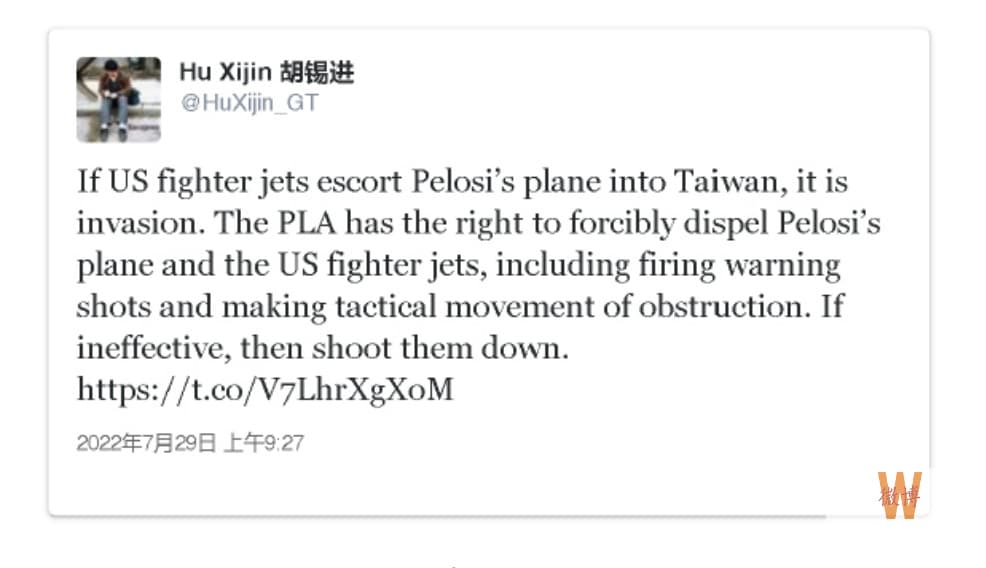On August 3rd, a day after Nancy Pelosi’s visit to Taiwan, Chinese blogger Chairman Rabbit (兔主席) posted a long piece of text on Weibo rebuking political commentator Hu Xijin (胡锡进) for his overdosed hawkish claims leading up to Pelosi’s controversial visit.
Following the post by Chairman Rabbit, grandson of a former CCP leader, Chinese social media saw many discussions and a wave of criticism against Hu and his overaggressive position.
In his since-deleted post, Chairman Rabbit demanded stricter regulation of Hu’s public statements due to his perceived ties with the Chinese government.
Hu Xijin is a Chinese journalist and the former editor-in-chief and party secretary of Global Times, a Chinese and English-language media outlet under the auspices of the Chinese Communist Party’s official People’s Daily newspaper.
Although he retired from his job, Hu is still a very active commentator on political affairs via social media. With nearly 25 million fans on Weibo and over half a million followers on Twitter, his posts and statements often go trending and influence public opinions.
Chairman Rabbit argued that Hu has built a credible reputation in his field, both within China and abroad, where he is generally perceived as having certain authority to speak about China’s political affairs – with some foreign media almost regarding him as some sort of spokesman for the Chinese government. Meanwhile, according to Chairman Rabbit, Hu uses this credibility to promote his own personal views.
“He was too loud. It would make the people think that [China’s] actions are not enough, bringing about disappointment and distrust. This is damaging to the morale of the people and also to the credibility of the government,” Chairman Rabbit wrote.
Two Political Commentators “Protecting China’s National Interests”
Chairman Rabbit is the alias of Ren Yi (任意), a Harvard-educated Chinese blogger who currently has over 1.8 million followers on Weibo, where he calls himself a ‘history blogger.’ He is also the grandson of former Chinese politician Ren Zhongyi (任仲夷), who was a leader in China’s reform period since the late 1970s. ‘Chairman Rabbit’ is known as a nationalist, conservative political commentator who often comments on US-related issues and current affairs (for more on his background, check out this article by Tianyi Xu).
The Chinese blogger’s post came after a week in which Hu Xijin recurringly went trending for his strong condemnation of a potential visit to Taiwan by U.S. House Speaker Pelosi.
Hu suggested that a Taiwan visit by Pelosi would be a clear provocation of China, giving the PLA “good reason” for “waging a war.” One of Hu’s tweets, in which he voiced the view that U.S. military planes escorting Pelosi to Taiwan could potentially be shot down, was deleted by Twitter on July 30. Afterward, Hu reiterated his views on Weibo and criticized Western censorship.

Hu Xijin tweet which was deleted by Twitter on July 30.
Chairman Rabbit wrote about Hu:
“(..) as we can see time and again, he lacks judgment and accurate sources of information on some major issues (..), and he represents only his personal views, which may be misdirected. If his views were perceived as being purely personal, they would not receive nearly as much attention – his “authority figure” status is the key to everything, and he is perceived as having a special channel to represent authorities.”
In the post, Chairman Rabbit accuses Hu of using his status to promote his own views and to influence the public debate and the international view of China to gain clout.
Hu Xijin responded to the post himself on his Weibo account, suggesting he felt betrayed and “deeply puzzled” to be attacked by someone he considered a “friend who worked together [with me] to defend China’s national interests,” writing: “I originally saw them as allies, yet right in the heat of the moment, I was surprised to find that that they suddenly turned their guns to aim it at me.”
In the same post, Hu still defended his own words, arguing that despite his “limited power” he still does what he can to “protect China’s national interests.”
“Frisbee Hu”
The Chairman Rabbit vs Hu Xijin dispute caught the attention of Chinese netizens, including the liberals and conservatives on Chinese social media.
With his muscle-flexing language, Hu seemingly regained popularity amongst die-hard nationalists on Weibo after long being suspected of being a “gongzhi” (公知), a derogatory use of the term “public intellectual.” The latest controversy shows that the interests of online nationalists do not always align with the official government stances.
It also shows a division between populist nationalists and the more elite or ‘establishment’ nationalists on Chinese social media. The former operate independently and are willing to pressure the government toward a more hostile foreign policy, while the latter follow the decisions of the government and respond to them.
Hu is known for commenting on political issues and tuning into official narratives, which even led to him being nicknamed “Frisbee Hu” (胡叼盘), suggesting he can catch the ‘frisbees’ thrown by the Communist Party like a dog catches his toy.
However, it seems he did not catch their ‘frisbee’ this time. For the CCP, it arguably would be not a wise choice to engage in any kind of military conflict at this time, knowing the unpredictable societal changes it may bring to its regime, especially ahead of Xi Jinping’s bid for a third term in office at the 20th party congress later this year.
Authorities did emphasize that China would not “idly sit by” if Pelosi would visit Taiwan. Chinese Ministry of Foreign Affairs spokesperson Zhao Lijian warned the U.S. on August 1st that if the U.S. House speaker would visit Taipei, “the Chinese side will respond resolutely and take strong countermeasures to defend our sovereignty and territorial integrity.”
But the aggressiveness of Hu Xijin’s posts perhaps went beyond what the authorities had in mind. According to Chairman Rabbit, Hu “influenced public opinion, and China’s international image as well. What he got in the end was traffic for his own account.”
Instruments to Govern the Public Sphere
On social media, Hu still received a lot of support while others agreed with Chairman Rabbit that Hu was chasing clout and that his words have consequences. Although that is not necessarily bad – as his influence can mobilize and channel public rage in a time of strict Covid measures and a declining economy, – it can also backfire and reflect negatively on the government when they fail to meet the public’s expectations.
Chairman Rabbit suggests that it might be better for Hu to put a disclaimer and clarification at the top of any statement to make it clear that his views are personal and do not represent the official view.
This is not the first time Hu gets caught up in a conflict between Chinese populist and establishment nationalists. In 2021, Hu had a public spat with Shen Yi, a professor at Fudan University. When Shen Yi defended a controversial post by the CCP Central Political and Legal Affairs Commission which put an image of the Chinese rocket launch besides that of a mass cremation in India, Hu argued that official accounts should not ridicule India’s Covid deaths but “express sympathy for India, and place Chinese society firmly on the moral high ground” (read here).

At that time, however, Hu sided with the so-called ‘establishment nationalists’ advocating for more decent public expressions from an official government account at a time when their neighboring country was mourning the victims of their Covid outbreak.
Disputes such as ‘Hu vs Shen’ and ‘Hu vs Chairman Rabbit’ could be seen as instruments to govern the public sphere, shifting the focus of attention amid online storms. The ‘Hu vs Shen’ public spat shifted the subject from whether it is moral to ridicule a neighboring country for its tragedy to whether it is good for an official government account to ridicule a neighboring country for its tragedy.
Similarly, the ‘Hu vs. Chairman Rabbit’ dispute shifted the subject from whether it is moral to wage a war over Pelosi’s visit to whether it would be in China’s best national interests to wage a war and to the influence of online public commentators within this matter.
Chairman Rabbit posted a second lengthy post regarding the dispute on August 4th, in which he again reiterated his stance that Hu Xijin’s tone on social media did not match the official stance, and that Hu, with limited diplomatic and military knowledge, miscalculated his response to the Pelosi issue and guided public opinion in the wrong direction.
The dispute between the two influential commentators triggered discussions, with some bloggers wondering when the next round of bickering is going to take place. In doing so, Chairman Rabbit has also been instrumental in channeling nationalist sentiments and creating some calm after the online storm following Pelosi’s visit.
“I think the Propaganda Department needs take responsibility, as they tacitly accepted Hu Xijin’s influence on public opinion. They can’t later shift all the blame to a person who’s already retired,” one popular comment said: “Those who are responsible should take responsibility! Our propaganda has always seen some problems, both internally as well as externally.”
Other commenters think Hu Xijin is getting too much credit for being held responsible for shifting public opinion. “My friends don’t even know who Hu Xijin is, yet they had also shifted in the ‘prepare for war’ direction,” one Weibo user writes, with another person adding: “He’s just saying out loud what I was thinking already. If everyone said it, it might be blocked, but he can speak for us.”
“Hindsight is 20/20,” others say: “And we might need hawkish expressions such as those published by Hu. I still support him.”
By Xiuyu Lian and Manya Koetse
Get the story behind the hashtag. Subscribe to What’s on Weibo here to receive our weekly newsletter and get access to our latest articles:
Spotted a mistake or want to add something? Please let us know in comments below or email us. First-time commenters, please be patient – we will have to manually approve your comment before it appears.
©2022 Whatsonweibo. All rights reserved. Do not reproduce our content without permission – you can contact us at info@whatsonweibo.com.
The post Chairman Rabbit vs Hu Xijin: Divided Nationalists on Weibo appeared first on What's on Weibo.